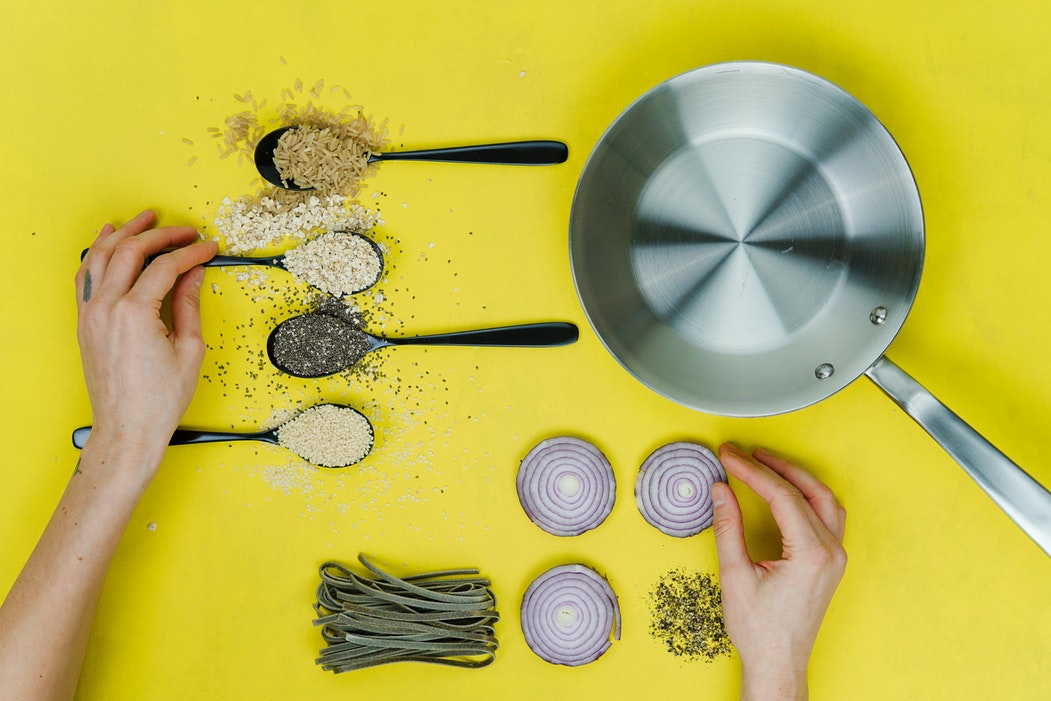Making good meals is a sure-fire way to conjure happiness for yourself, as well as friends and family. It can be tricky starting out on your own if you didn’t do much cooking at home, but there’s no better time to practise your culinary skills than at University, where you can be your first test subject…
That aside, the other advantages of improving your cooking are saving money, a healthier diet, and more choice. In addition, you could save a lot of time in the long run if you prepare your meals at the weekend and store them for the week. While cooking is a fairly easy skill to start, it is wise to prepare for your journey to ‘student chef’ by collecting the basic tools and having an idea of what you’d like to make.
Weapons of choice – choose the best tools

When buying, consider the store’s reputation for making long-lasting equipment, how well you can hold them, and whether you’ll definitely need it.
A basic list of things you might need are:
- two saucepans of different sizes,
- a frying pan,
- a set of knives,
- chopping boards (ideally one for raw foods and one for vegetables),
- an ovenproof dish,
- a colander (also serves a steamer if you buy a metal one),
- cutlery,
- can opener,
- a pack of cooking utensils (spatula, ladle, large spoon),
- mixing bowls, and
- crockery.
Similarly, there are a certain number of staples that are a good call in any student store cupboard. They come up thyme and thyme again in many recipes, so they are worth keeping handy for quick dishes. A lot of the below can be bought in bulk, which is often cheaper.
- Salt and pepper
- Olive oil, vegetable oil or equivalent
- Garlic
- Chilli
- Soy sauce
- Eggs
- Onions
- Butter, margarine or jam
- Canned tomatoes
- Dried mixed herbs
- Stock cubes
- Tomato purée
- Milk or milk alternative
- Vinegar
- Rice, couscous, potatoes, pasta, noodles, bread and similar carbohydrates

Experiment with different cuisines
As I mentioned earlier, you are your first test subject when it comes to student cooking, so this is ample opportunity to try out various types of global dishes and see where your strengths lie.
Testing your skills with foreign cuisines also allows you to branch out from more conventional ingredients. Plus, even if the recipe doesn’t work out, you’ll have learnt which ingredients you’re not so good at cooking with. Last year I tried to make a pasta sauce using a high-quality brand of mustard, after that failed attempt the mustard jar’s remaining contents were confined at the back of the fridge for about 6 months. Now I know not to use mustard in my future recipes, and no one else’s taste buds had to suffer but my own.
The world foods aisle of your local supermarket stock a decent range of less familiar ingredients, but you can also check specialist stores since they often have a larger variety of more authentic goods.

Build up a collection of recipes
This could mean buying a cookbook, but you could also search for interesting recipes online and print them out or save them to the cloud. A good selection of recipes is so handy on days when you need to whip up an easy meal but there’s an eclectic mix of vegetables in the fridge and you’re not sure how to cook them together. A recipe collection offers inspiration into how you could use that random mix to make something tasty, or at least edible. Think of it this way – if cooking is sorcery, a recipe collection is your spell book (and maybe a ladle is your wand?).
A final point to make is, enjoy the culinary experience. Customise recipes to your heart’s content, and try out what you want, rather than what you’re expected to make. Above all, be proud of your efforts, not all dishes will go well the first time round and may take years to perfect. Keep on making cooking exciting and fun for yourself because if you make cooking too much of a chore for yourself, you’ll end up having to cook to live. The real magic happens when you live to cook.

Pingback: Three quick takeaway-style student recipes | Tyfy.co
Comments are closed.